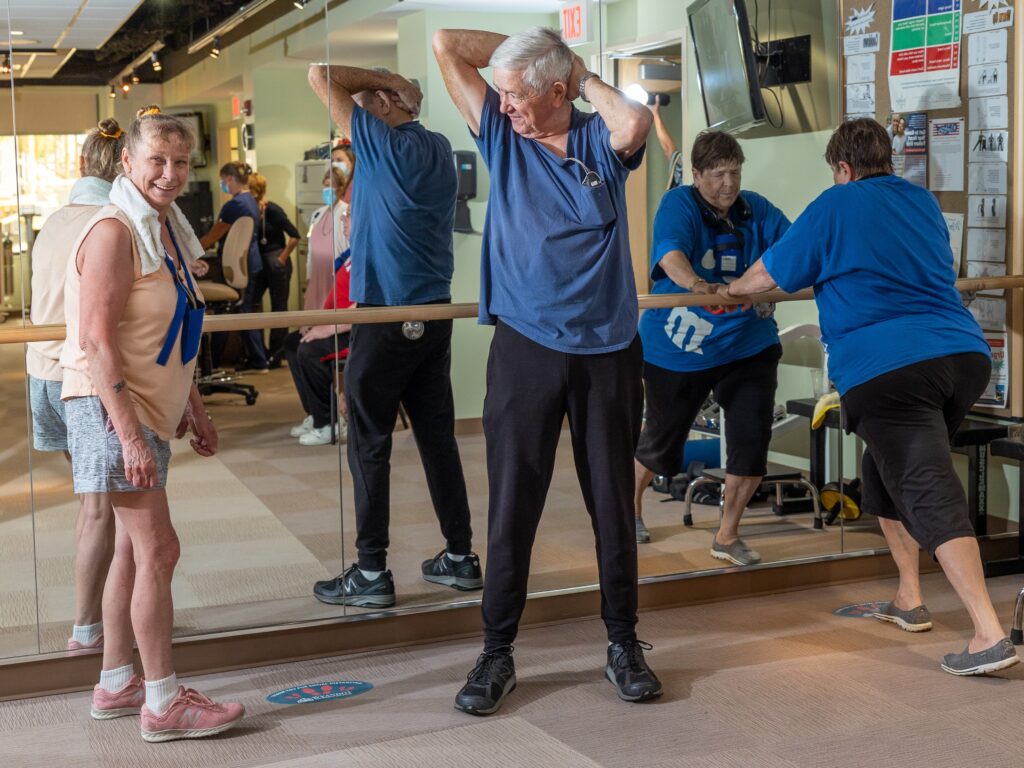Wyandot Memorial Hospital Wellness Center participants Georgia Heffelfinger(from left), Wayne Pelter and Dianna Koehler cool down at the end of their clinical rehabilitation programs. Heffelfinger was enrolled in pulmonary rehab, Pelter in cardiac rehab and Koehler in Supervised Exercise Therapy (SET). SET is the newest rehab program offered in Wellness and created for patients living with peripheral artery disease or peripheral vascular disease.
The Wellness Center at Wyandot Memorial Hospital added a new rehabilitation program for patients with peripheral artery disease (PAD) or peripheral vascular disease (PVD). The Supervised Exercise Therapy program – called SET – is a medically-supervised rehab to help improve circulation and reduce or eliminate pain while walking.
“PAD affects a lot of us as we age,” noted Wellness Center Director Sheri Clouse, “especially if we have a history of diabetes or smoking.”
Clouse explained PAD is a common circulatory problem caused by a gradual build-up of plaque in the arteries and primarily the arteries of the legs. It can cause disabling symptoms, including leg cramping while walking, leg pain while resting, nerve damage and skin breakdown.
“Some patients with PAD are unable to walk very long without stopping,” she said. “In SET we build up endurance and target the muscles that hurt when walking such as the calf, thigh and buttocks.”
Clouse indicated patient outcomes for SET rehab are best when exercise sessions last 30 to 60 minutes or longer and occur up to 3 times a week. The SET program typically lasts 3 months or 36 sessions as advised by the patient’s ordering physician.
“Much like our cardiac and pulmonary rehab programs at Wyandot, SET rehab provides emotional and social support with lifestyle modifications to help you regain functional capacity, increase walking distance, decrease symptoms and reduce risk for PAD, heart attack and stroke … all in a safe environment,” Wellness Center Exercise Physiologist Fortune Bormuth emphasized.
SET rehab also provides smoking cessation counseling and life skills to help reduce complications of diabetes, Bormuth added.
Clouse said the PAD acronym is often combined with PVD, as PVD is the generic term describing a large number of circulatory diseases. PAD is just one specific vascular disease that affects the arteries.
The cost of SET rehab at the Wellness Center is covered by Medicare and other insurances.
“We’re so excited to be one of the first in our area offering SET rehab,” Clouse stated. “This program is proven and makes such a great difference in being able to do the things you want to do.”
She suggested individuals interested in knowing more about SET may contact their medical provider to determine if SET would be the best treatment for their leg pain. Clouse and Bormuth also welcome questions about SET and other Wellness Center programs. They are available by phoning 419-294-4991, extension 2236.

